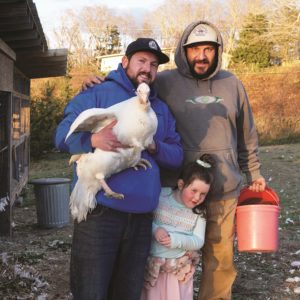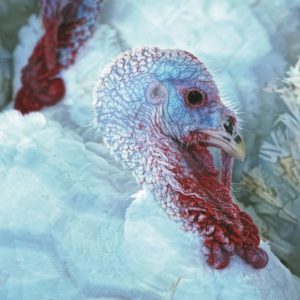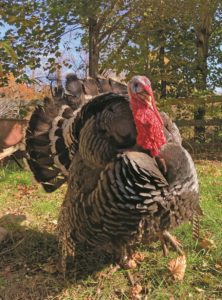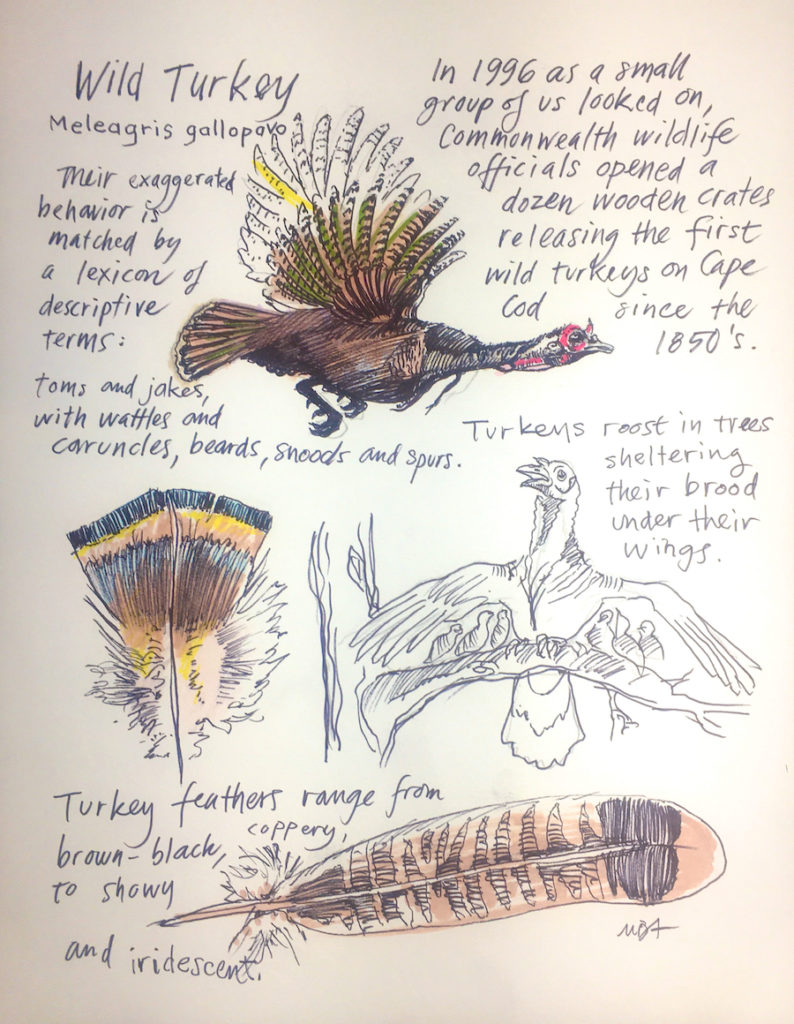TRURO — Not far from Route 6 but seemingly worlds away, Drew Locke raises chickens, cows, pigs, and turkeys on an expanse of land that has been farmed for seven generations. The eight-acre farm sits about a mile from Corn Hill Beach on Perry Road, where Locke’s mother’s ancestors started working the land in 1850.
As the asphalt road gives way to a long dirt driveway, the whoosh of Route 6 and the suburban plots of million-dollar homes fade into memory. There is a once-upon-a-time feeling to this place where the barking of an Australian sheep dog named Lucy and the gobbles of 62 penned turkeys greet a visitor.
At this time of year, the topic on the table is turkey. Locke wants those who buy his birds to consider what they enable the family to do — preserve a farm and a way of life, and maybe restore a healthier way of eating to a whole community.

A week before Thanksgiving, Locke, who is 32, had finished his day as the head custodian at Truro Central School, where his daughter, Remi, is in kindergarten. He had a few minutes to chat. Then he had to race the impending sunset to go wrangle five pigs who were headed off to slaughter.
His white heritage-breed turkeys still patrolled a pen that overlooks the pasture. The 22-week-old birds would soon become the centerpiece of a good many local feasts. An average 19-pound bird sells for $122 — about $6.40 per pound. Locke said he expected to sell out — he sells at the Orleans Farmers Market, and his farm has an online store.
Locke won’t profit much from his turkeys this year. Grain prices went up during the pandemic, from $14 to $18 a bag. If he were to pass that increase on to his customers, he said, he would have to charge $8 a pound.
“The grain is top-quality, and it shows in the meat,” he said. But Locke is resisting raising his price. “I don’t want to do it at all,” he said, shaking his head at his own stubbornness.
Locke grew up around the family farm. His grandfather, Stephen Perry, ran a poultry operation, keeping some 10,000 chickens here until the 1980s, he said. Before that, the Perrys raised dairy cattle. His mother, Deb Perry, kept horses, but she didn’t go into farming. She is the postmaster in North Truro. His father, Mike Locke, is a carpenter working for the Truro Dept. of Public Works.
“The whole organic, local farming thing” had not quite taken off yet when Locke was born, he said. His elders urged the seventh generation to find employment in a different field.
“My grandfather was not making money,” said Locke. “We just knew we enjoyed feeding the animals.”
Locke did not take his elders’ advice. A few years after graduating from Provincetown High School in 2007, Locke began to think seriously about raising meat animals. They would give him the winter off, he reasoned. Most of them — the turkeys, up to 1,700 chickens, and a few pigs — are born in the spring and slaughtered by Thanksgiving. Cows are the exception, but Drew’s brother, Mike Locke, would tend them over the winter.
First, Drew decided, he would need to finish college. “I knew no one would take me seriously unless I got a degree,” he said. He enrolled at Cape Cod Community College “to get my GPA up,” he said. Then he entered the UMass Stockbridge School of Agriculture — the same school his grandfather had graduated from in 1959.
There he studied sustainability. That means “using your land for what it offers you. Don’t overdo it for the bottom line. Keep the products you raise to feed your community” Locke said. The focus on community includes “educating the kids at a young age, so they understand why this is important,” he said.

Locke started raising chickens after he graduated from UMass in 2011. He added the pigs and the turkeys over the last few years. Other family members grow vegetables, which are sold at their Hillside Farm Stand on Route 6. But Locke is plenty busy with the livestock. “These are live animals,” Locke said. “There are no weekends off.”
When the Oct. 27 nor’easter was approaching, Mike and Drew had to figure out which way the wind would come so they could build a barrier to keep the turkeys’ grain from getting wet.
“Turkeys are sensitive,” Drew said. “They overreact.” You must be careful not to get them upset, he added, or they will begin to hurt themselves. Every broken wing becomes a loss on the bottom line.
Though they gobbled enthusiastically on the afternoon of a recent visit, the turkeys go silent at dark. They have poor nighttime vision, and their instincts tell them to beware of the predators that roam nearby. A weasel — or maybe it was a raccoon — got into the chicken coop in June and took out 40 chickens, Locke said. The attack happened one day before his wife, Amie, gave birth to their son, Everett, and just a week before the eight-week-old birds were to be harvested.
“I have been chasing that money ever since,” Locke said.
As the shadows from the hoop house grew longer over the yard, Locke’s aunt Cheryl Perry pulled down the driveway, and soon Aunt Sam Perry’s car kicked up the dust as well. Brother Mike, who works for a landscape company full-time, grabbed a bale of hay to feed the cows. “I’ll be right back,” Mike said. “The cows are mad at me.”
As his extended family gathered, Locke said, “This is what happens at the end of the day. The support from family and friends is critical.”
The end of the season is in sight. Locke will sell chickens throughout the winter at the Orleans Farmers Market, but the turkeys will be gone by Thanksgiving. Then in April, when the baby chicks arrive by mail, it will all start up again.


